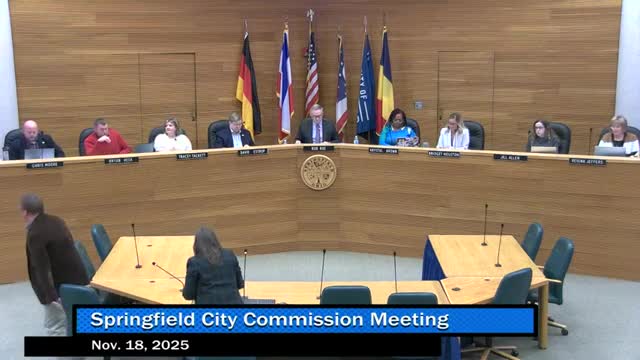Springfield students urge commission to oppose House Bill 172, saying parental-consent rules would block mental-health care
Get AI-powered insights, summaries, and transcripts
Subscribe
Summary
A youth-led group, BATS, told the commission House Bill 172 would require parental consent in most cases and create barriers to school-based mental-health services; students and commissioners exchanged questions and praise, and students planned to give opposing testimony at the State House the following day.
Members of BATS (Bringing Awareness to Students), a youth-led substance-use prevention and mental-health awareness group, told the Springfield City Commission they oppose Ohio House Bill 172 because it would tighten parental-consent requirements and make accessing school-based mental-health support more difficult for many students.
"House Bill 172, if it were to pass, would eliminate this access to mental health resources without parental consent and require every student in any in every situation to get that parental consent," Emerson Davian, BATS vice president, said. He and other students described situations in which parental consent could be a barrier for students who have abusive, neglectful or unavailable parents.
Mary Cunningham, BATS president, said the group represents about 50 members from roughly 10 schools and has researched the bill and related policy options. Student speakers cited Youth Risk Behavior Survey (YRBS) statistics during their remarks: "50% of middle school students do not have a trusted adult, and 40 percent of high school students do not have a trusted adult," Anya Amir said, as part of an argument that the bill would worsen access for vulnerable students.
Usaid Ashraf (Usaid Ashraf) and Jack Hill recounted personal and school-based observations to illustrate how requiring parental consent could delay or block interventions. Usaid described an incident where an adult'guardian response emphasized discipline rather than attention to a student's needs; Jack and Emerson said the bill would sever relationships between students and trusted adults in school who can connect students to care.
Commissioners responded with praise and questions. Mayor Rue said he was initially skeptical of the students' position but that their testimony had been "compelling," and several commissioners commended the students for research and civic engagement. The students requested that commissioners mention the issue to state representatives and encouraged community members to submit testimony opposing the bill; BATS delegates said they planned to provide testimony at the State House the next day.
No formal city action was taken at the meeting; students asked the commission to raise the issue with state legislators and to amplify local testimony.
